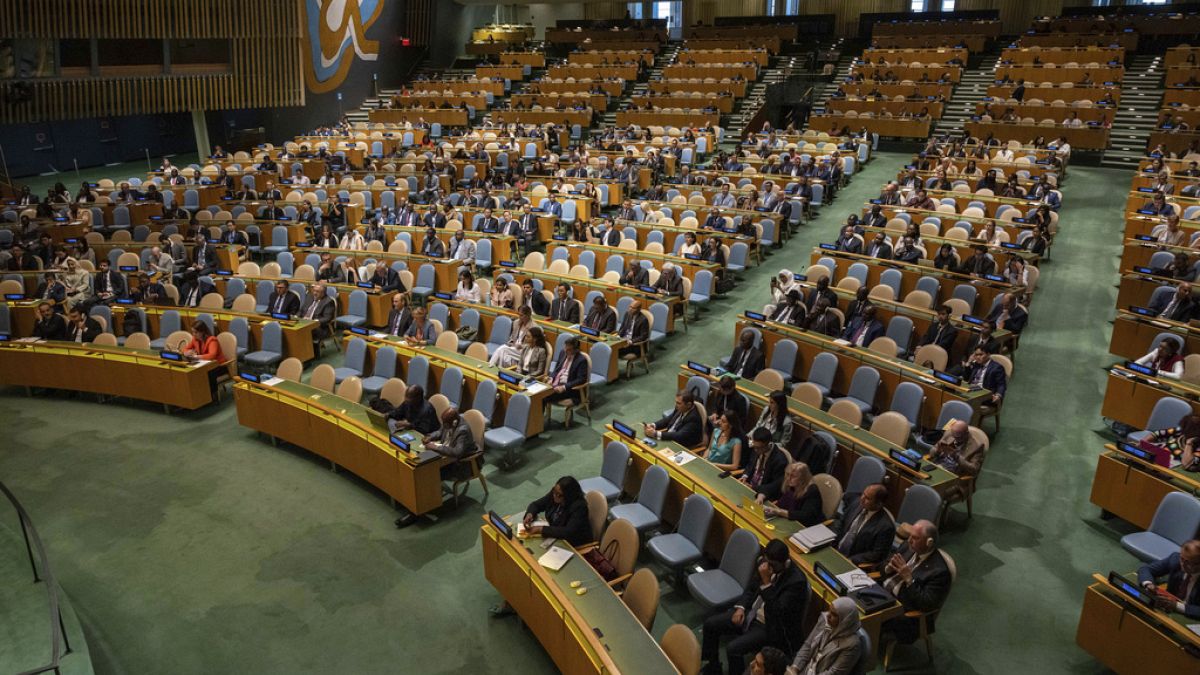Borrell warns Israel and Hezbollah fighting risks a ‘full-fledged war’

Speaking at the UN General Assembly, the EU’s foreign policy chief commented on the need to avert a wider war in the Middle East, as well as giving an update on the EU’s assistance to Ukraine.
The escalating conflict between Israel and Hezbollah is threatening to explode into a full-fledged war, EU foreign policy chief Josep Borrell has warned.
The EU foreign policy chief made the comments following the informal meeting of EU foreign ministers on the sidelines of the 79th United Nations General Assembly (UNGA) in New York.
He added that strong diplomatic mediation efforts are required to avert the worst outcome.
This year’s high-level general debate is centred around the theme: “Leaving no one behind: acting together for the advancement of peace, sustainable development and human dignity for present and future generations”.
‘Civilians paying an intolerable, unacceptable price.’
On Sunday, 500 people were killed and 4,400 people injured by Israeli airstrikes, according to Borrell, who said the number of casualties suggests that there is no consideration for the civilian impact of the strikes.
Borrell said the attacks are both targeted and random: “Targeted because of the purpose and random because of the consequences”.
He condemned the strikes, which he said are forcing civilians to pay an “unacceptable price”, and warned that an escalation in the conflict is a danger to the whole region.
Borrell also volunteered that the path towards peace starts with a ceasefire in Gaza and the implementation of the UN Security Council Resolution 1701, originally adopted in 2006, which calls for the cessation of hostilities between Israel and Hezbollah.
Borrell criticised the Security Council’s failure to put the resolution into force.
“Almost 20 years ago [and] I am still asking for the implementation of this resolution,” he said, expressing concern that the Security Council risks losing legitimacy. “Because either they don’t agree on anything, or when they agree it’s not implemented.”
Compromise, but not on core values
Ahead of the UN General Assembly, European Parliament President Roberta Metsola spoke up for the importance of multilateralism in a world that she says is facing an “ever-increasing fragmentation in politics and communities”.
Speaking at the 2024 Concordia Annual Global Affairs Summit, she explained that the European Parliament must re-learn how to compromise without diluting its core values, and that doing so is essential to finding common ground.
“In the European Parliament, we have 720 members who belong to groups across the political spectrum,” she said. “I can tell you it often feels impossible, but we find ways. We build majorities not by entrenchment, but by seeking common ground through compromise.”
The Eastern front
On the war in Ukraine, Borrell said he believes that Russia has been receiving arms from Iran, particularly missiles. He voiced serious concern over the fact that these have come close to, and in some cases entered, EU member states’ territory.
The EU diplomat applauded Ukraine for its successful efforts in striking and destroying important depots of ammunition deep inside Russian territory, and said the G7 will continue to discuss Kyiv’s potential use of long-range weapons in the upcoming week.
Borrell said he had been clear about his position on the matter, and that he is in favour of the use of long-range weapons against Russia.
“Not everybody is supportive of this position. But let’s see what is the position at the end of the week.”
Borrell emphasised that Ukraine needs the EU’s support more than ever, especially regarding the energy situation in Ukraine, emphasising that “Russia wants to put Ukraine into the dark and the cold” as winter approaches.
“We have made at the Commission a proposal to raise up to €35 billion alone to support Ukraine, both military and economically,” he said.
“And both these have to be done at the same time. It doesn’t make sense to provide you with an electricity generator today if it has to be destroyed tomorrow.”
Additional sources • EBU
Related
A New Book Argues That What Happens in Europe Doesn’t…
Remaking the World: European Distinctiveness and the Transformation of Politics, Culture, and the Economy by Jerrold Seigel “No issue in world
Poland plans military training for every adult male amid growing…
Poland’s prime minister, Donald Tusk, has said his government is working on a plan to prepare large-scale military training for every adult male in response t
2025 European Athletics Indoor Championships: Ditaji Kambundji secures women’s 60m…
Switzerland’s Ditaji Kambundji walked away from the 2025 European Athletics Indoor Championships in Apeldoorn on 7 March with much more than her first Europea
Takeaways from the EU’s landmark security summit after Trump said…
BRUSSELS (AP) — European Union leaders are trumpeting their endorsement of a plan to free up hundreds of billions of








